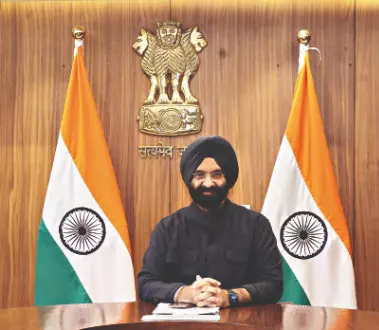Delhi’s roads to snack on smog

New Delhi: Delhi may soon see roads and pavements that literally “eat smog.” In a bid to strengthen the city’s armour against toxic winter air, the Delhi government has announced a time-bound scientific study on photocatalytic coatings that can break down harmful pollutants and make public spaces safer to breathe.
Environment minister Manjinder Singh Sirsa has directed the Environment
Department to fast-track a feasibility study on titanium oxide (TiO2)-based “smog-eating” surfaces. These coatings, when applied to roads, pavements, and tiles, are known to reduce nitrogen dioxide (NO2) and other harmful hydrocarbons through a photocatalytic process activated by sunlight.
“Delhi will evaluate and adopt the best of proven photocatalytic technologies, prioritising safety, sustainability, and measurable impact to deliver cleaner air faster,” Sirsa said. He added, “Delhi’s fight against pollution is personal, for every child, every senior, every worker, and we are putting simple, safe, science-based tools on the ground, measuring results openly, and scaling up quickly wherever families can feel the difference in the air they breathe and in their lives.”
According to the government’s plan, the Environment Department will sign a memorandum of understanding with a reputed scientific institution within 30 days. Field trials will then be conducted on selected city stretches. Progress reports will be shared monthly, and a final study report will be submitted within six months.
“If the study confirms that these smog-eating surfaces are effective and cost-efficient, the Department will move a Cabinet proposal for rapid, citywide deployment at priority locations such as busy corridors, markets and public spaces to deliver visible, people-first gains in air quality,” Sirsa said. The minister underlined that safety, sustainability, and value for money would be the guiding principles for evaluation, along with mapping credible suppliers to enable quick scaling if results are positive. Sirsa also linked the initiative to Delhi’s broader innovation agenda. Highlighting the success of the Delhi Innovators’ Challenge, he said, “From day one, this administration has backed innovation to find real, on-ground answers to pollution, backed by science, tested on our streets, and scaled for people.” He urged startups, students and researchers to bring forward their ideas, assuring that “Delhi will test them, fund what works, and take it citywide so every family can breathe easier.” The move marks another technology-driven step in Delhi’s year-round environmental action plan aimed at easing the city’s air crisis.



